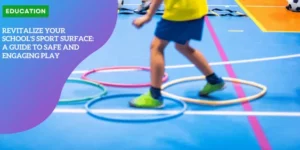Building Future Leaders: The Impact of Inclusive School Sports Programs
School sports are a cornerstone of student life.
They offer an enriching blend of fun and fitness, teaching students to collaborate and strive toward common goals.
Engaging in sports helps students develop a sense of belonging and identity, critical aspects of their personal growth.
Mental Health and Personal Development
Participating in school sports brings numerous mental health benefits. It can boost self-esteem and reduce stress, offering a natural outlet for emotions while encouraging healthier lifestyle choices.
This engagement fosters personal development, honing qualities like discipline and resilience.
Building School Spirit and Community
Sports have a unique ability to unite schools and communities.
Events and matches create a shared spirit, enhancing student and community identity. Students learn to support and trust each other, fostering a deep sense of camaraderie.
The journey through school sports enriches student experiences and lays a strong foundation for personal growth, seamlessly setting the stage to explore the development of essential life skills through athletic involvement.
Developing Essential Life Skills Through Sports
Fostering Teamwork, Discipline, and Social Skills
Participating in school sports provides an invaluable foundation for developing teamwork, discipline, and social skills.
When students collaborate on the field, they learn the importance of working together towards a common goal.
This sense of unity can translate into other areas of life, enhancing social connections and community engagement.
Discipline is built through consistent practice and dedication, fostering a strong work ethic that benefits students throughout their educational journey.
Enhancing Time Management and Confidence
Balancing academics and athletics requires strong time management skills.
Students involved in sports must learn to organize their schedules efficiently, which is a skill that proves invaluable as they progress in their academic and professional careers.
Participation in sports also boosts confidence as students achieve personal and team goals, providing a sense of accomplishment and motivation to tackle future challenges.
Building Soft Skills for Success
School sports help cultivate soft skills, such as resilience, adaptability, and communication, which are essential for success in the modern world.
These skills are not confined to the sports field; they extend into classrooms and future workplaces, preparing students for diverse challenges and opportunities.
As students continue to grow, the skills nurtured through inclusive sports programs will guide them toward becoming capable and confident individuals.
The Impact of Sports on Student Wellbeing
Correlation Between Organized Sports and Improved Wellbeing
Engaging in organized sports provides significant mental health benefits, creating a positive environment for students’ wellbeing.
The structured nature of sports imbues students with a sense of accomplishment, improving mental health by fostering discipline and regular physical activity.
Research highlights a strong correlation between participation in sports and enhanced student wellbeing, underscoring how well-rounded activities can contribute to personal growth.
By offering a break from academic pressures, sports encourage physical and emotional balance, promoting an overall healthier lifestyle.
Sports as a Tool for Promoting Relatedness and Community Engagement
Sports play a vital role in building a sense of relatedness among students.
By being part of a team, students experience community engagement, encouraging them to connect with peers and develop meaningful relationships.
This community feeling helps build identity and belonging, as students are integrated into a network of support.
Through local team sports, students establish a bond with their community, which extends beyond the school’s walls, enhancing the school spirit and unity.
This environment fosters not just physical health but emotional resilience as well.
Positive Effects on Self-Esteem, Motivation, and Cognitive Development
Participating in sports impacts students positively by boosting self-esteem.
Achieving goals and enjoying the sport increases a student’s confidence and motivation to excel.
This ripple effect often extends into the classroom, where attitudes toward learning and engagement can improve due to the skills and confidence gained on the field.
Studies also suggest a relationship between sports and cognitive development, as physical activity stimulates mental alertness and focus.
This dual benefit—enhanced cognition coupled with increased confidence—crafts a holistic student development pathway.
Balancing sports and academic demands encourages enhanced time management skills, aiding students in their educational and personal lives.
These foundational elements of wellbeing and cognitive growth lay a strong groundwork as students progress beyond school, echoing the benefits of sports in shaping a well-adjusted adult.
Enhancing the Curriculum with External Sports Programs
Engaging Experts for Enriched Learning
Introducing expert external sports providers into school programs adds significant value.
These specialists bring a wealth of knowledge and experience that can greatly enhance the curriculum.
Teachers often feel more at ease allowing these professionals to lead, knowing that students are receiving top-notch instruction.
External providers can deliver specialized training, ensuring students learn proper techniques and maintain a safe sporting environment.
Professional Development for Teachers
Partnering with external sports providers opens up professional development opportunities for teachers.
Educators can learn new techniques and methodologies, broadening their skill set.
This collaboration not only benefits teachers but also enriches students’ learning experiences, making sports education more dynamic and effective.
Overcoming Barriers for Disadvantaged Students
External sports providers can play a pivotal role in overcoming participation barriers for disadvantaged students.
Financial and logistical constraints often limit access to sports, but these providers frequently supply their own equipment and conduct sessions during the school day.
This approach allows all students, regardless of background, to enjoy the benefits of organized sports and its positive impact on mental and physical health.
The integration of external sports programs not only supports inclusivity but also paves the way for lifelong engagement in physical activity, setting the stage for sustainable healthy habits.
Equipping Schools for Inclusive Sports Programs
Variety of Equipment for Diverse Needs
Schools aiming for inclusive sports programs need to invest in various equipment to cater to different needs and budgets.
For younger students or recreational activities, affordable basic equipment from department stores is sufficient.
This can include simple volleyballs or cricket sets for light play during beach excursions.
For more formal sporting events, schools can turn to wholesale suppliers for items like rubber discuses, along with badminton rackets and shuttles.
Investing in such equipment enables schools to offer a well-rounded sports experience that accommodates diverse interests and skill levels.
Balancing Recreational and Formal Requirements
Balancing recreational activities with formal sports ensures that all students have the opportunity to enjoy and benefit from physical activities.
While recreational sports foster fun and social engagement, formal sports develop discipline and competitive spirit.
Schools must thoughtfully curate equipment to support both, ensuring that students can engage meaningfully regardless of their focus.
Importance of Durable, Shared Equipment
Durable, shared sets of sports equipment play a crucial role in ensuring accessibility for all students.
By investing in robust and long-lasting equipment, schools can extend the lifetime use of their resources, allowing multiple classes to participate without the strain of wear and tear.
This approach not only promotes inclusivity but also maintains cost-effectiveness for school budgets.
Together, these strategies contribute to creating a vibrant and inclusive sports culture in schools, setting the stage for deeper engagement and enrichment through sports.
Boosting School Spirit and Student Engagement
Organizing Sporting Excursions
Sporting excursions can transform school experiences by taking learning outside the classroom.
Schools can plan trips to local facilities, parks, or beaches to engage students.
These activities encourage not just physical fitness, but also community connection.
Familiarity with local spaces helps students feel rooted and enhances their sense of belonging.
Recognizing Achievements
Celebrating success is crucial in nurturing enthusiasm. Schools can acknowledge students’ efforts in sports with certificates and awards.
These tokens of recognition boost morale and foster a supportive environment.
Designing certificates or hosting awards ceremonies can be a simple yet effective way to strengthen school spirit.
Fostering School Pride
Through a thoughtful approach to sports, schools can create an inclusive culture that instills pride.
Regular involvement in sports encourages teamwork and unity, contributing to a vibrant school identity.
By taking these steps, students develop a lasting connection to their school community, creating a foundation for lifelong engagement in physical activity.
Conclusion: Cultivating Lifelong Healthy Habits
School sports play an invaluable role in shaping students into healthy, active adults.
By participating in organized sports, students learn habits that promote lifelong wellness.
Physical activities instill not just a passion for movement, but also a deeper appreciation for health.
Long-Term Benefits
Involvement in school sports provides a range of long-term benefits. Students develop endurance, strength, and flexibility through regular exercise. These physical benefits extend beyond the playing field, fostering healthier lifestyles well into adulthood. By engaging in sports, students learn to incorporate physical activity into their daily routines, reducing long-term health risks.
Encouraging Lasting Enthusiasm
Sports can ignite a love for physical activity that lasts a lifetime.
The enjoyment and camaraderie found in sports encourage continuous participation.
It’s about finding joy in movement and making it a natural part of life.
Through school programs, students discover sports they love, paving the way for lifelong engagement.
Contributions to Healthy Adult Life
Regular sports activities teach students valuable life skills that contribute to becoming healthy adults.
Persistence, teamwork, and leadership learned in sports are applicable in various life situations.
Embracing these experiences helps in managing stress, enhancing mental health, and leading balanced lives.
By equipping students with these skills and experiences, school sports lay the groundwork for an active, fulfilling life.
Through each game and practice, students build a foundation for future success, both personally and professionally.







